2024 | November Newswrap: Highlights from La Via Campesina member organizations around the world
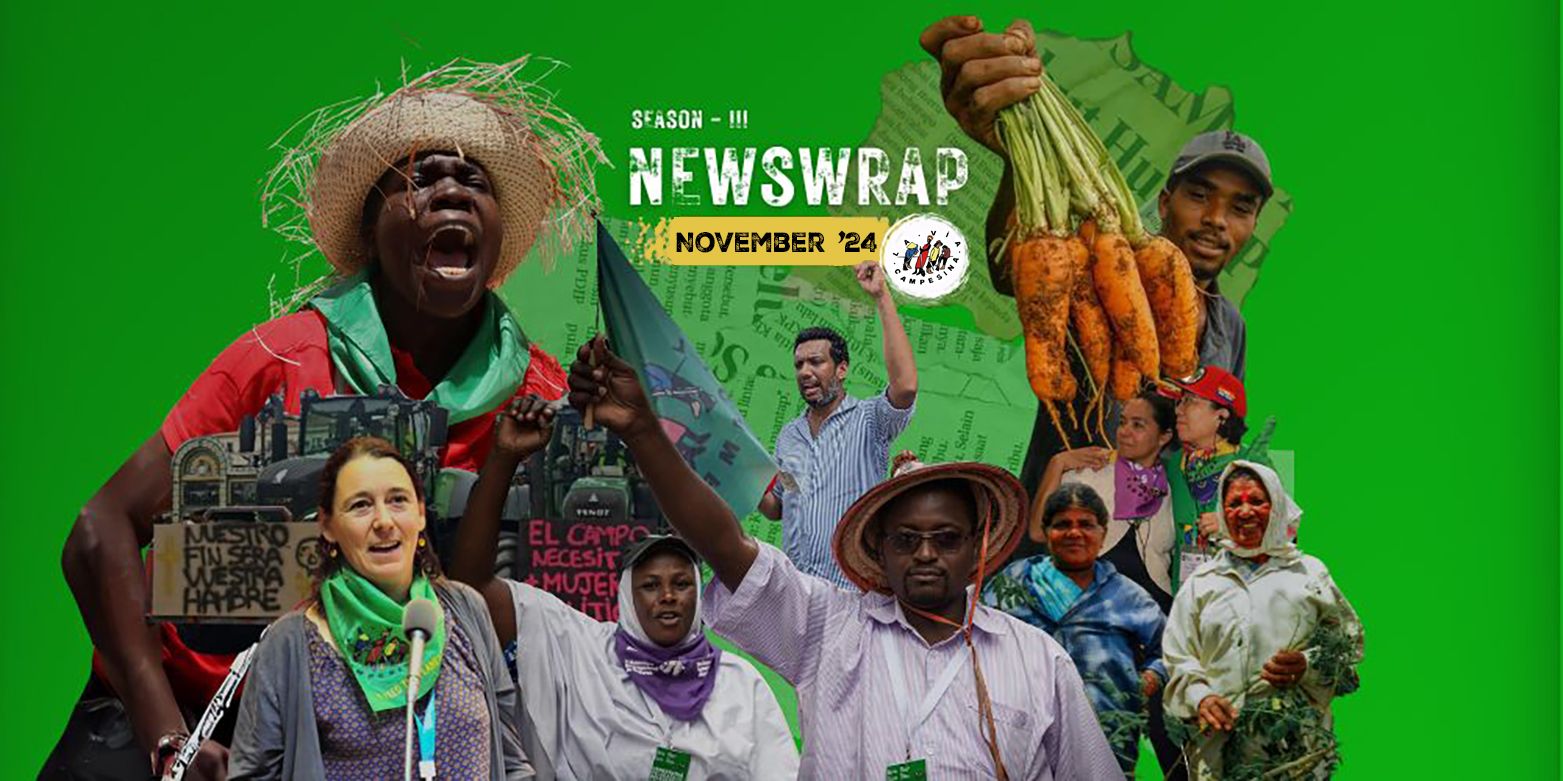
#25Nov24 : International Day for the Elimination of Violence against Women commemorated with mobilizations around the world
The current context of multiple crises, exacerbated by brutal occupations, wars and conflicts, is causing poverty, hunger, migration, death and femicide around the world. Any solution to the crises demands that gender and social justice be at the center of our political agenda.
Women, constituting the majority of the peasant, indigenous, landless, pastoralist, fisherfolk, nomadic, gatherers and agricultural workers, play a fundamental role in Food Sovereignty and food security, and economy. They produce more than half of the world’s food production, and build climate resilience, conserve biodiversity and the provide essential care for families, communities and Mother Earth. However, they continue to experience the structural violence of patriarchy, capitalism and imperialism.
Thus, in the international call for action on #25Nov24 La Via Campesina insisted that deliberation and action are needed within our movements, but also in communities, societies and countries. Follow all the action around the world on our padlet here and our special webinar.
This month, the international peasant movement participated in #COP29 in Baku and issued a statement on its main responses to the climate crisis. It denounced the false solutions, such as carbon markets, offset schemes, genetically modified crops, geoengineering mega projects, “Climate Smart Agriculture” and “Nature-based solutions”. These solutions reinforce an imperialist development agenda, deepening colonialism, patriarchy and environmental degradation. Consequently, they erode the cultural, ancestral and territorial rights of Indigenous Peoples, traditional communities and peasants.
In Paris, a photo exhibition organised by the City of Paris opened on November 21 and will run until 13 January next year. The exhibition. The exhibition includes La Via Campesina photos highlighting the central role of peasants and the diversity of rural workers.
The Week of Actions of Solidarity with Palestine was organised from Sunday, November 24 to Friday, November 29. The mobilisationcalled for protests and campaigns for justice and to stop the genocide in Gaza.
This month marked the Eighth Anniversary of the signing of the Peace Agreement in Colombia. La Via Campesina joined to celebrate the progress in the implementation of the six points of the Agreement. The peasant movement reaffirmed its commitment to continue working to build a sustainable peace for all.
The following is a brief overview of the main actions and activities carried out by our member organizations in Asia, Africa, Europe and the Americas this month.
Starting with news from Latin America: In Honduras, during a protest in Tegucigalpa, women’s organizations including La Via Campesina members denounced impunity in femicides and gender violence. They urged authorities to take effective measures and investigate cases of murders of women in Honduras. They also questioned the inaction of the authorities in the face of the impunity and poverty that affect women. A dignified and peaceful life for all can only be be achieved by addressing the structural causes of violence.
The Committee of Campesino Unity (CUC) of Guatemala held its 13th National Assembly to analyse the political, social and economic context of the country. This exercise helped the organisation to understand the current challenges and plan their actions in defense of indigenous and peasant communities. A study on “Violence against indigenous women and the impact on their lives in the Polochic Valley” was shared during the meeting. It highlighted the realities faced by indigenous women in the Polochic Valley and called for action to combat the violence and protect their rights.
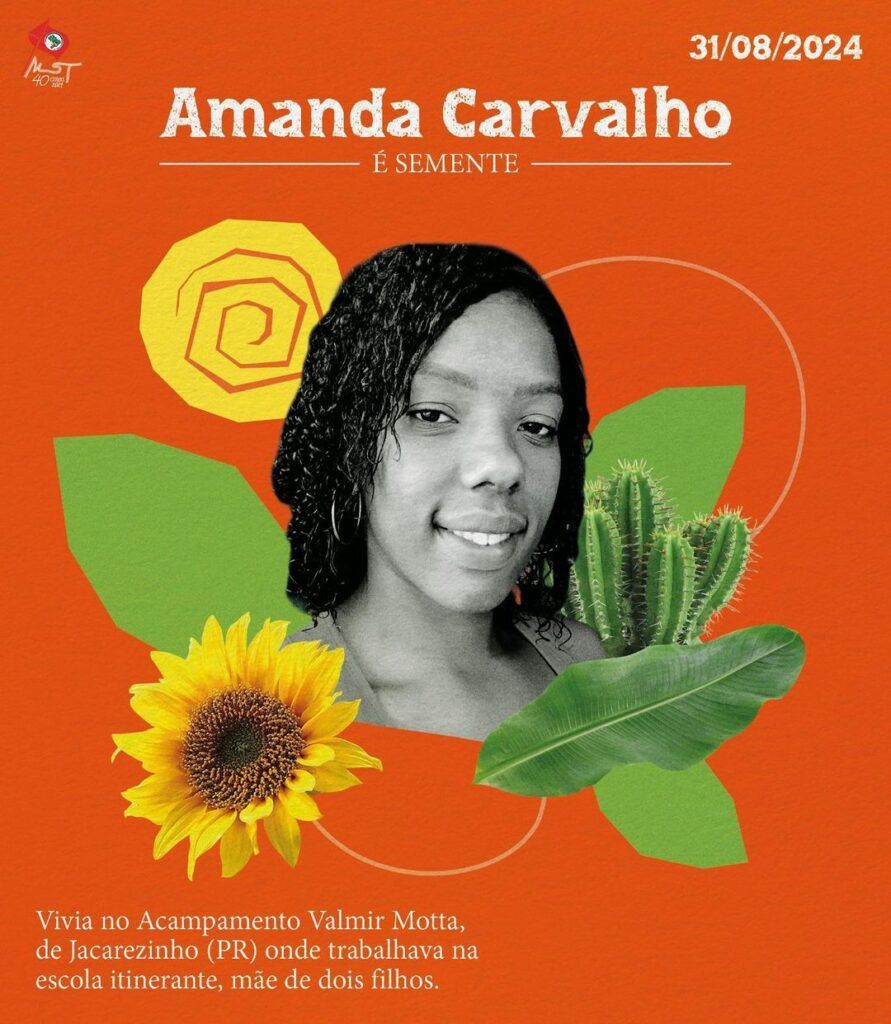
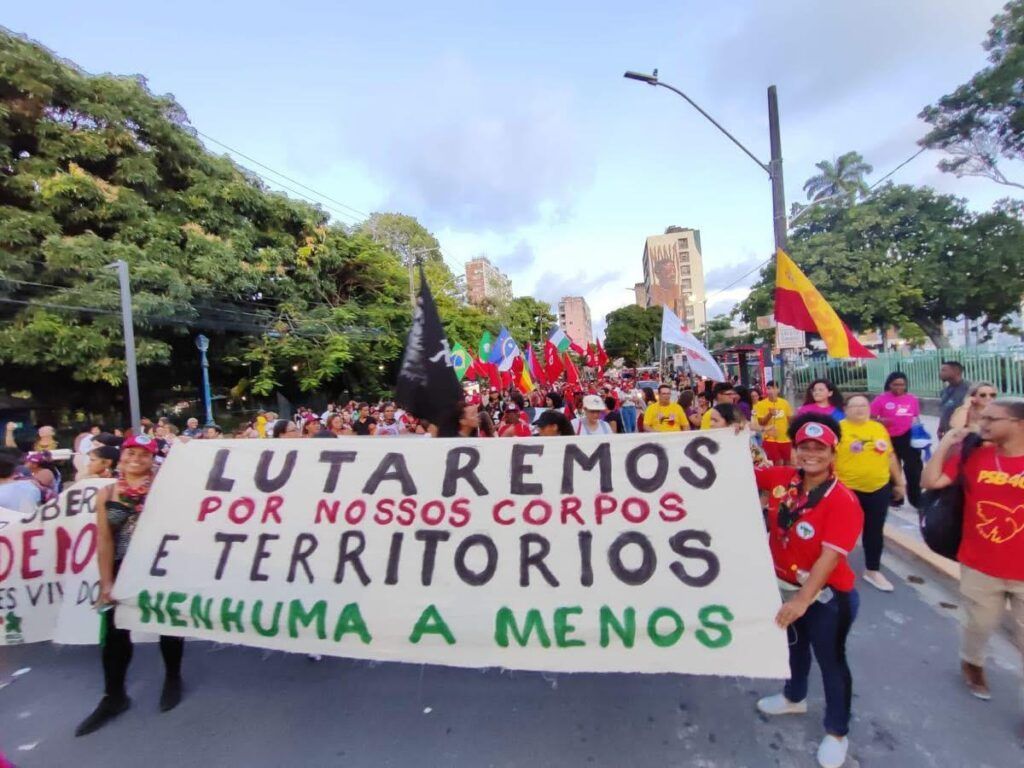
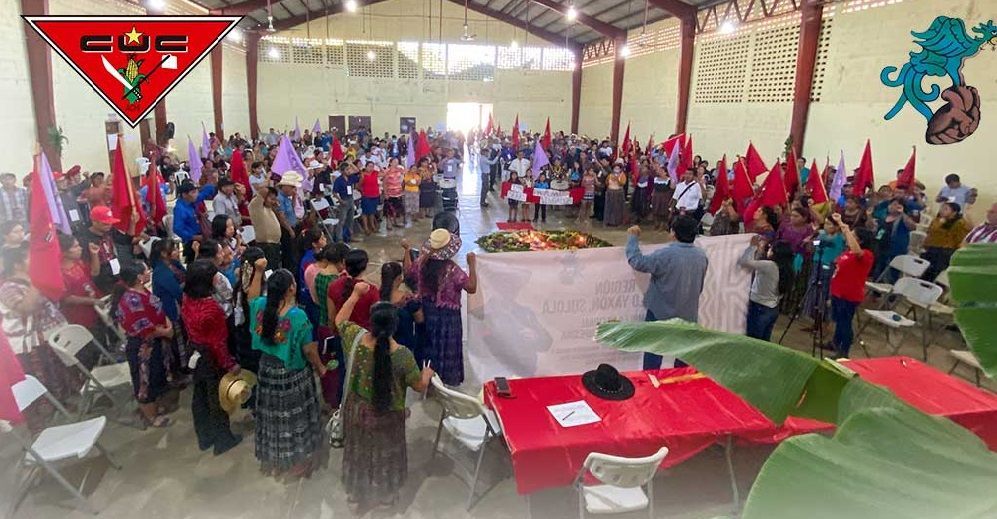
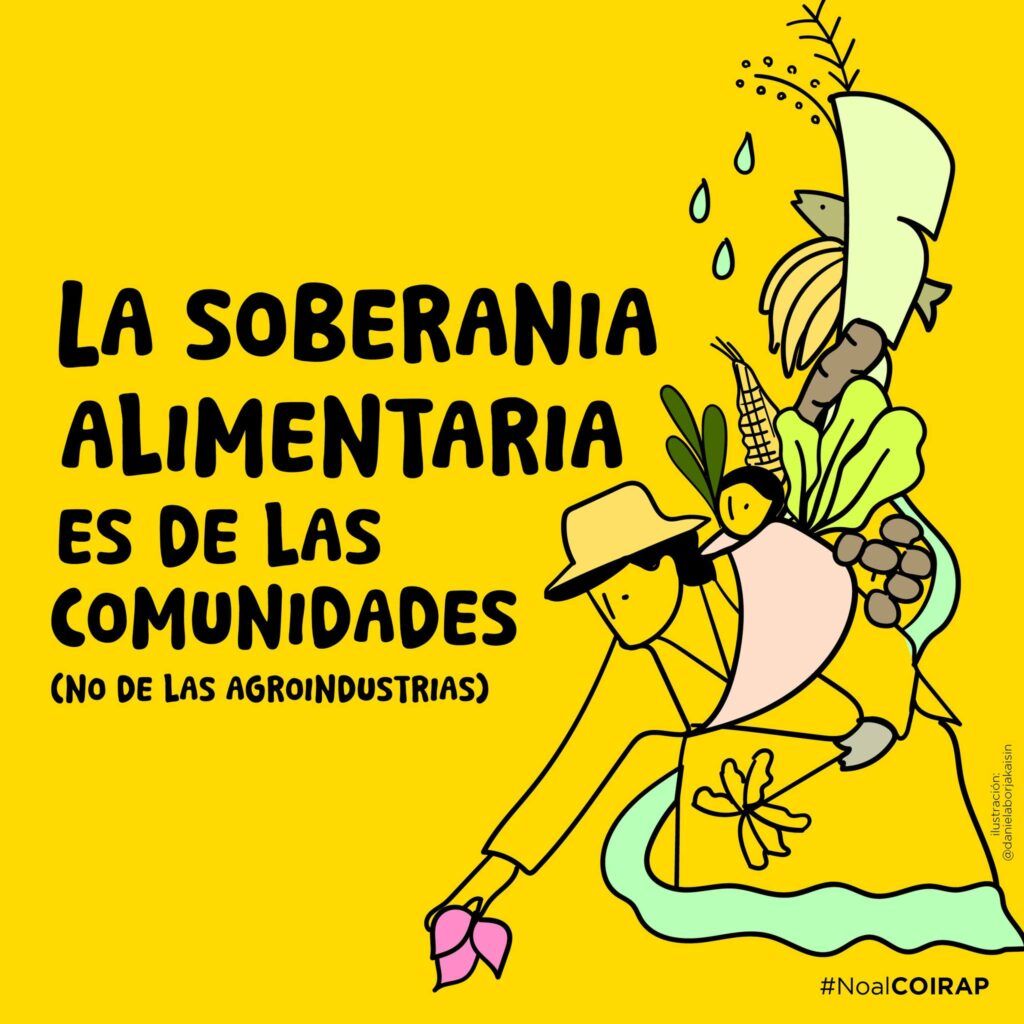
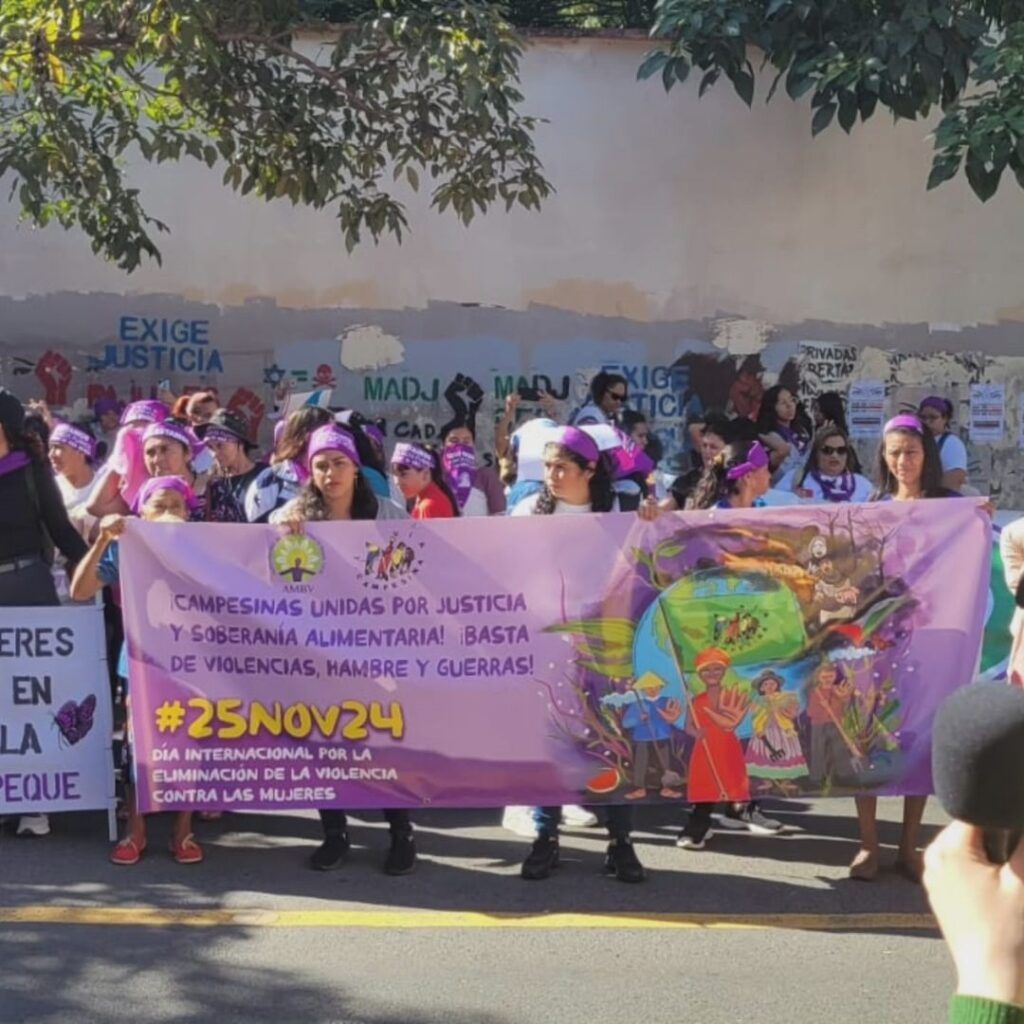
In Brazil, between November 20 and 25, the women of the Landless Movement of Brazil organized the National Day to Combat Violence Against Women and Girls. The actions held in the five regions of the country. A series of collective activities of care and affection were also carried out in MST areas throughout the country. Training, meetings, moments of listening, exchanges and sharing were organised to strengthen the struggle for relationships free of all forms of violence.
In Colombia, Fensuagro, celebrated the closing of the diploma course on “Participation and Political Advocacy of Peasant, Indigenous and Afro-Colombian Women”. This 115-hour training course focused on equitable access to land and environmental protection. The training was attended by women leaders from the 7 regions of Colombia, the National Women’s Team and regional coordinators of FENSUAGRO. During the training, they shared knowledge, experiences and motivations.
The National Assembly of Ecuador is processing the Comprehensive Organic Code Project for the Reactivation of the Agricultural and Fishing Sector (COIRAP). Peasant and Indigenous Organizations and other civil society organizations that are part of the Platform for Food Sovereignty are demanding that the project to be stopped as it only benefits agribusiness. They demanded that the Assembly comply with existing regulations on Food Sovereignty.
The Caribbean region, this November 25, joined the call of the international CLOC-Via Campesina, for justice, Food Sovereignty. The members denounced wars, genocide and anti-democratic interference in their countries through economic blockades. The region highlighted the urgency to continue the collective and articulated struggles to denounce and put an end to the historical violence against women and social structure in our rural areas.
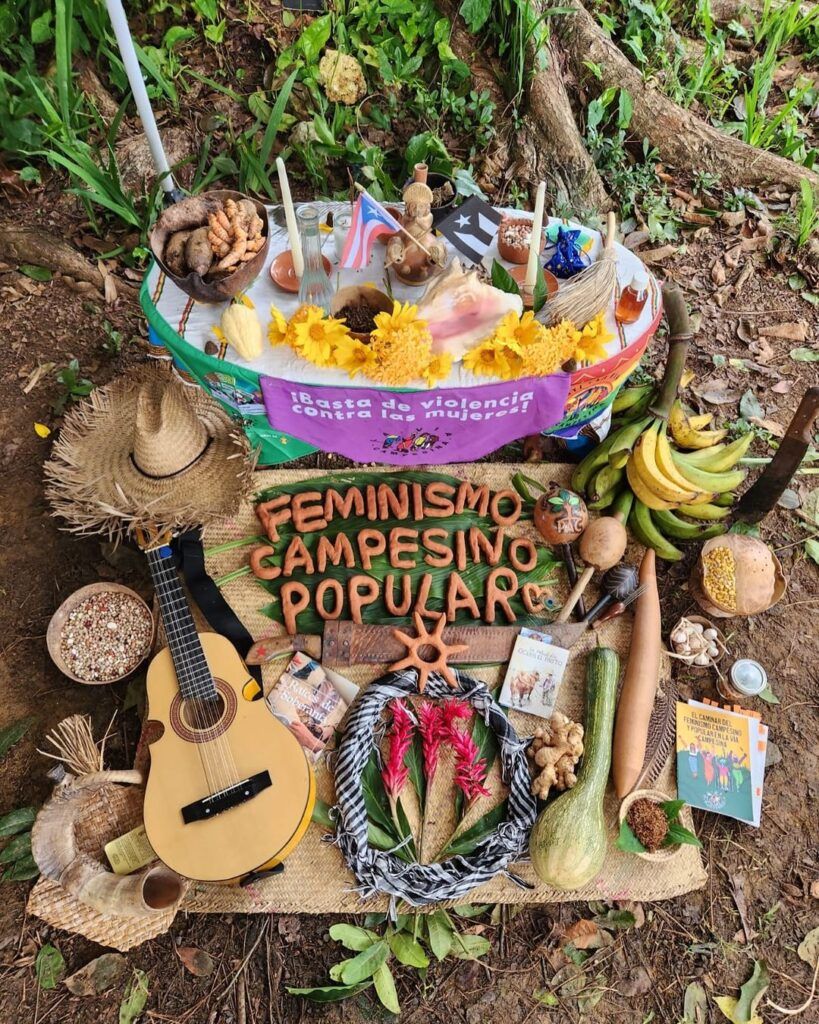
The BORICUÁ Organization in Puerto Rico held its First Meeting of the Women’s Articulation, and adopted the agenda of the continental and international women’s articulation of the Cloc – Via Campesina. With the slogan “Sowing Food We Harvest Freedom” the women committed to strengthen the articulation and to influence the local agenda to defend their rights.
We move to North America: From November 21 to 23, the National Farmers Union of Canada held its Convention in Saskatoon. Under the theme “Valuing Farming, Land and People” the NFU invited its members to reconnect with other farmers, farmworkers and allies to fight for favorable agricultural policies for Food Sovereignty. Experiences of indigenous cooperatives empowering communities and preserving traditions were shared.
In the United States, Family Farm Defenders denounced the new GM wheat is a false climate solution that threatens farmers and wildlife. The organisation stressed that to secure farmers’ finances and the environment, more work should promote regional and local seed varieties instead of looking to multinational corporations for guidance. It is unfortunate that the government continues to ignore ethics and common sense, as it recently approved as “safe for breeding and cultivation” a new genetically modified (GM) wheat variety: HB4.
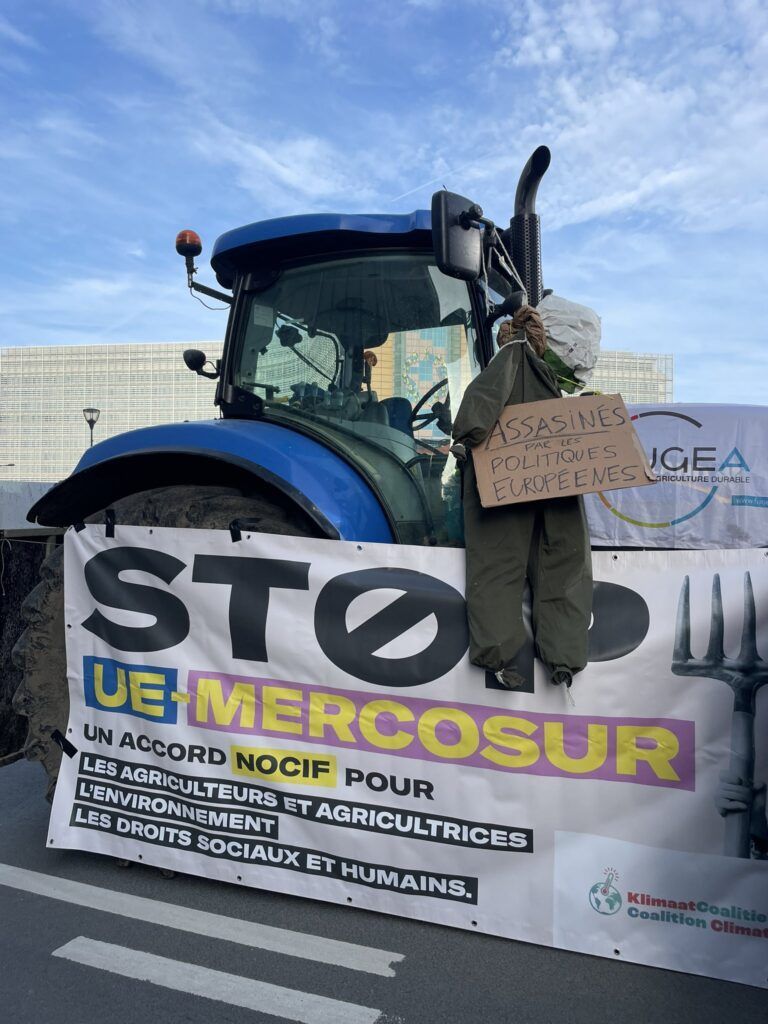
In Europe, On November 13, the European Coordination Via Campesina (ECVC) and its member organization FUGEA from Belgium mobilized in Brussels in front of the European institutions to demand an end to the EU-Mercosur FTA. This FTA threatens the livelihoods of countless small farmers and rural communities. Together with civil society organizations, trade unions and NGOs, they also demanded fair market regulation, minimum prices and a fair distribution of the Common Agricultural Policy budget to support a just and sustainable agroecological transition.
The European Coordination Via Campesina (ECVC) held its General Assembly on November 13 to 14. The event brought together 50 participants from 20 European organizations. Discussions involved youth, women and LGBTQ+ groups advancing political strategies. They stood in solidarity with farmers from Europe and South America in a protest against the EU-Mercosur FTA and addressed key issues such as the CAP, forest management, access to land and digitization of agriculture, highlighting shared struggles across Europe.
In Africa, North Africa and Arabic region: On November 25, FNSA Morocco joined several women’s organizations and human rights groups to organize a protest in front of Parliament. The protest denounced violence against women worldwide and supported Palestinian women. The event included speeches addressing the challenges faced by women in Palestine and around the world, highlighting the connection between gender and socio-political issues. Activists from different sectors, including agriculture, participated and showed their solidarity and advocated for an end to violence and discrimination.
In Tunisia, on November 25, the One Million Rural and Landless Women’s Association launched the “We Are Everything” campaign. The campaign which ends on December 10, denounces the marginalization of women agricultural workers by the State and their lack of recognition in food production and food sovereignty. The campaign aims to have “female farmer” recognized in their identity documents. The recognition will facilitate women’s access to land, financing and the implementation of projects.

In Togo, the Togolese Coordination of Peasant Organizations and Agricultural Producers (CTOP) participated in the Regional Forum on Agroecology and Organic Agriculture held in Nigeria. In addition to contributing to the discussions, CTOP participated in the forum’s exhibition to showcase the richness and diversity of its members’ agroecological practices. The exhibits showcased the innovation and commitment of producers to a more sustainable agricultural future. It demonstrated the potential of agroecology to strengthen food sovereignty in West Africa.
The Kenya Peasant League commemorated the International Day for the Elimination of Violence against Women by organizing a virtual awareness campaign against gender based violence. They emphasized that women farmers play an important role in food production, stating that the violence faced by women farmers must stop.
ESAFF Uganda farmers held a meeting in Bugiri district on December 3 and interacted with various stakeholders on the impact of gender based violence and explored solutions to end GBV in communities. They also conducted an informative and educational radio program on gender-based violence in communities and how to overcome it.
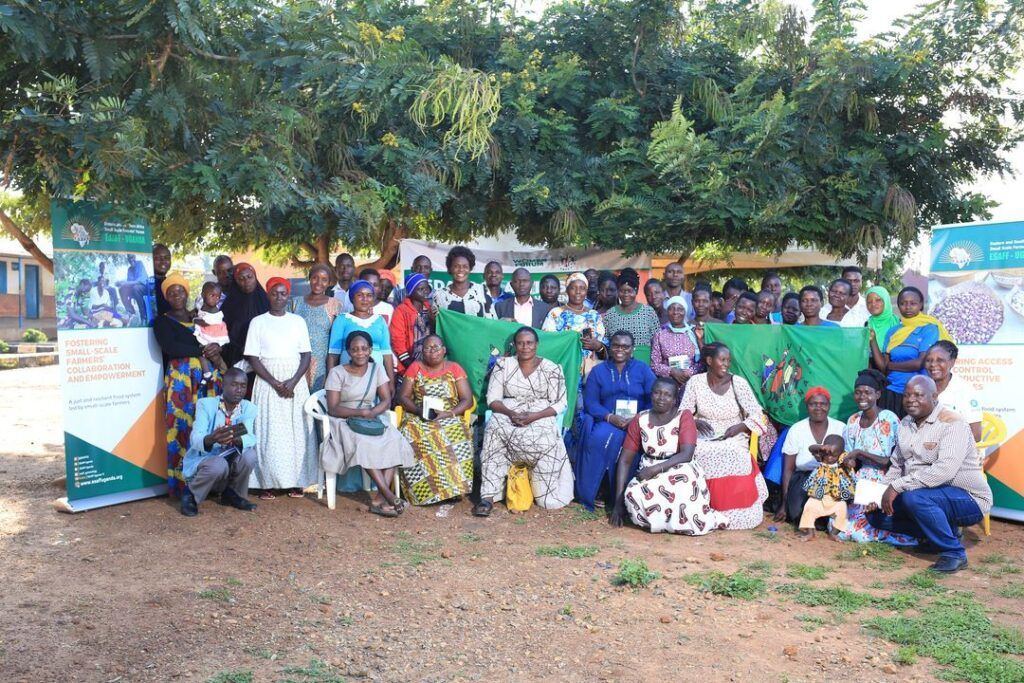
Moving to Asia, South Korean farmers’ organizations have condemned their president’s decision to impose martial law in the country. In a statement issued by the country’s peasant organizations, they have thanked the parliament for unanimously voting against the president’s undemocratic move. They have also called on all peasant unions, students and citizens to come together in a public demonstration on December 7 in defense of democracy. The situation continues to evolve and we will have more updates in the next issue.
On November 23, the Assembly of the Poor of Thailand organized a public protest to commemorate the 35th anniversary of the opposition to the Kaeng Suea Ten dam. The event included a sacred forest ordination, discussions and exchange of experiences among various partner networks. In the evening, a fundraising concert was held to support ongoing activities.
In Nepal, the Nepal Federation of Peasants held a solidarity action in support of the Palestinian people and their unwavering struggle against occupation, calling for an immediate end to the ongoing genocidal war. Dozens of people attended the public demonstration on November 29 in Kathmandu, which was also part of the week of action to end violence against women and girls. Women farmers’ leaders and organizers called for an end to all forms of violence, stressing that the situation of women and children in Palestine requires immediate global attention and action.
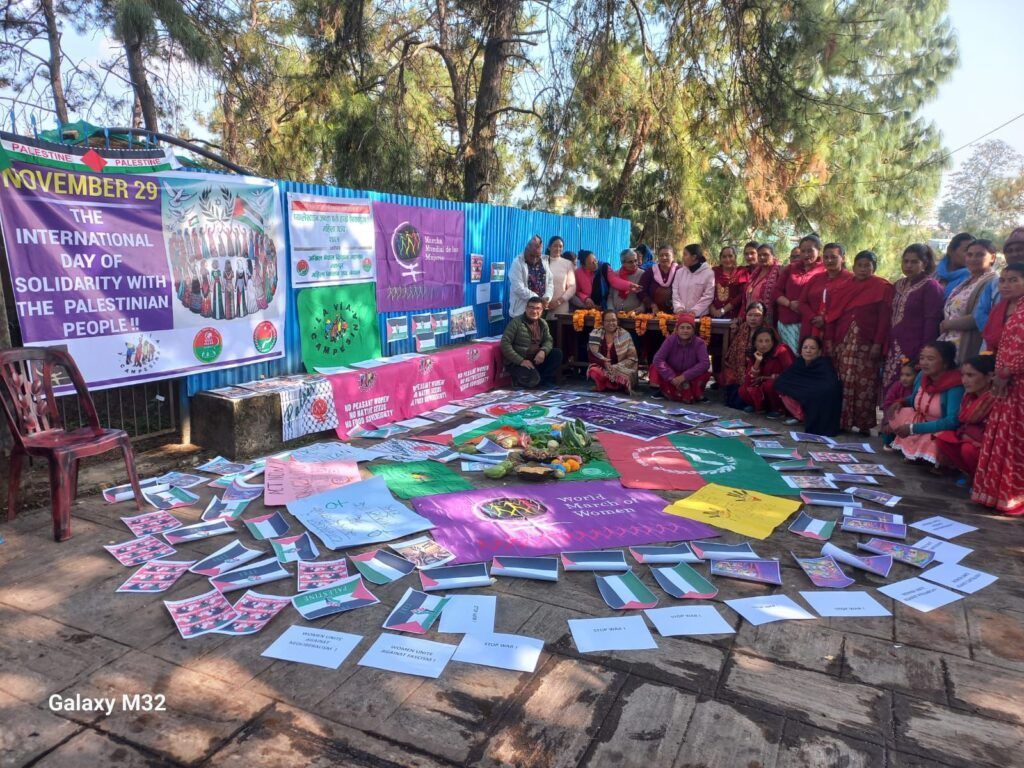
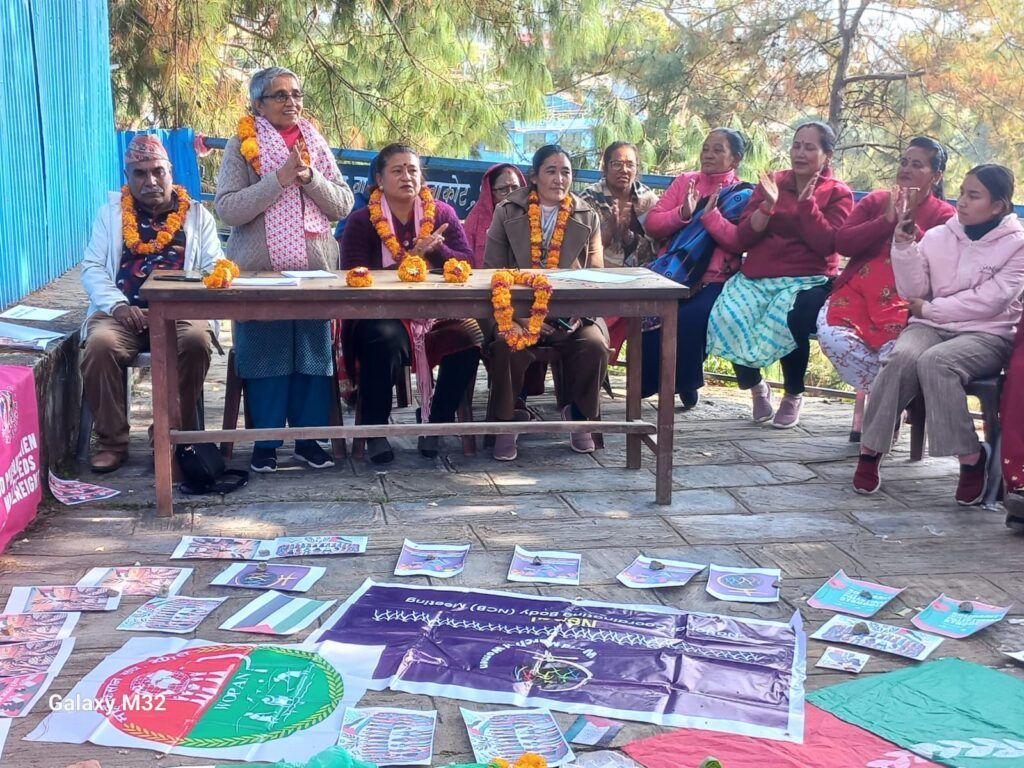
In Sri Lanka, the Movement for Agrarian and Land Reform (MONLAR) held a press conference to clarify its position on the national debt situation. The debt has been perpetuated by institutions such as the International Monetary Fund. MONLAR stated that the IMF must recognize the mandate given to the National People’s Power (NPP) in the presidential election, which was not intended to continue the injustices and long-standing damage caused by neoliberal policies to the country’s agricultural sector and farming community.
The 1st La Via Campesina Asian Women’s Political School was held in Thailand. For five days, they came together in solidarity to learn about their shared struggles against capitalism, neoliberalism, patriarchy and colonialism, interconnected forces that uniquely impact peasant women in their countries. They also delved into the root causes of injustices faced by peasant women, including discrimination, false solutions, violence, microfinance, land grabbing, class and caste systems, Free Trade Agreements (FTAs) and climate change. They stated that the central problem affecting women in Asia is the corporate capture of native seed systems that rightfully belong to women.
We wrap up this months edition here. If there are any important updates we have missed, please send the links to communications@viacampesina.org so that we can include them in the next edition. We only include updates from La Via Campesina members. For a comprehensive update on various initiatives from November 2024, please visit our website. Previous editions of our news wrap are also available on our website, and condensed versions are accessible as a podcast on Spotify.
